Buddha Bowl with Cashew Sauce
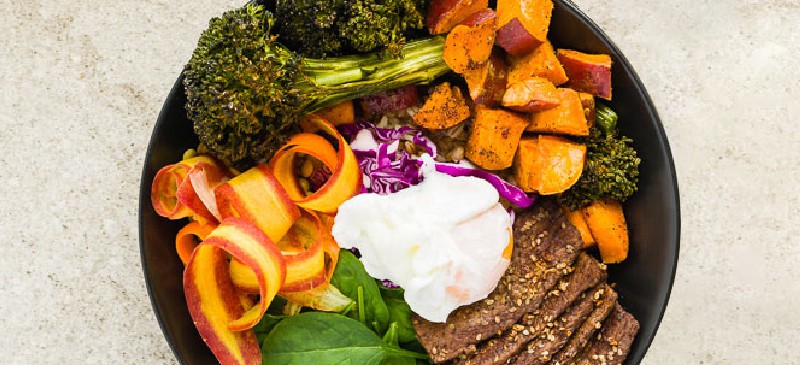
Have you ever heard the term “Buddha bowl”? The first time I did, I wasn’t sure what to think. Was it a Buddhist tradition I hadn’t heard of before or something like switchel, a drink that flew under the radar for years until hipsters revived it?
As it turns out, it’s neither and yet both. A Buddha bowl isn’t a political statement or something difficult and finicky to make. Instead, it’s a fun, easy way of eating that’s become one of my favorite ways of whipping up meals when I’m short on time but still want something delicious and creative.
What Is a Buddha Bowl?
You may have come across a Buddha bowl recipe on a café menu or seen them floating around Pinterest. Initially, the name “Buddha bowl” seems kind of random. The cheerful, belly-loving Buddha you’ve likely seen at local takeout places isn’t actually Buddha at all; he’s a monk who lived a good thousand years later. Buddha would’ve been a slim guy who was too preoccupied with keeping himself feeling zen than focusing on his meals.
He did, however, wander through the streets in the morning of whatever village he was hanging out in, carrying a big bowl. As he went past, locals would drop food in it as their donation and he’d eventually eat whatever was in the bowl. That’s right … this was the OG Buddha bowl.
I love this type of recipe because, let’s face it — meals are just more fun in a bowl! And while I’ve got my acai bowl and smoothie bowl recipes down pat, Buddha bowls sans Buddha are newer on the scene. They do, however, share similarities with other recipes that have become popular recently.
Are Buddha bowls the same as macro bowls? Not quite, although they share a lot of similarities. Like macro bowls, Buddha bowls usually have a mixture of complex carbohydrates, protein and healthy fats. But on a macrobiotic diet, which is where macro bowls are derived from, you steer clear of meat and eggs. With a Buddha bowl, you can certainly eliminate those ingredients if you’d like, but it’s not a strict rule.
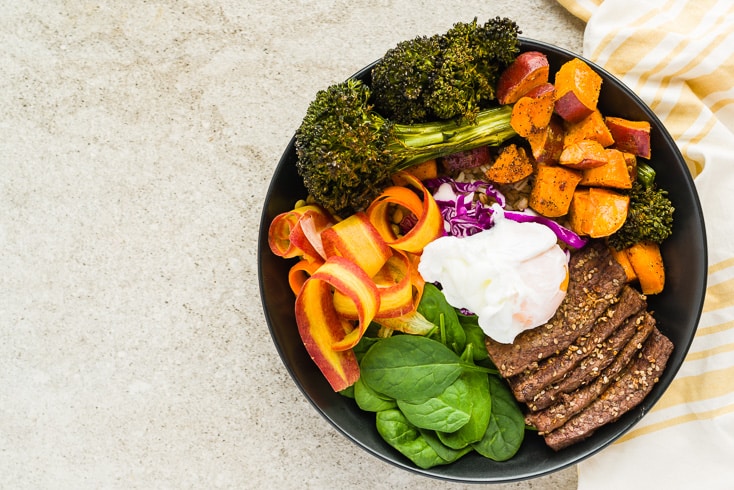
Buddha bowls are also similar to protein bowls which — as you may have guessed — are heavy on the protein foods side of things. But often, protein bowls go really light on the carbohydrates, even the good-for-you complex kind of carbs.
Buddha bowls, instead, are a little bit of all the different types of bowls. The good thing is there’s no hard and fast Buddha bowl recipe. Instead, it’s more of a concept. Buddha bowl recipes typically contain veggies, some sort of bean, a grain and a protein source. Because of how fluid Buddha bowls can be, they’re very easily customizable for all sorts of diets, including vegan and vegetarian.
Buddha Bowl Ingredients
Making Buddha bowls can be a great way to stretch your food budget, too. When building a Buddha bowl, sticking to fresh, seasonal veggies means you can get more bang for your buck. I love opting for a variety of colors and textures — crispy carrots with softer spinach, for example, or crisp bell peppers paired with chewy peas.
The beans included in Buddha bowl recipes mean you’re getting extra fiber and protein cheaply; lentils, chickpeas and black beans are favorites. For grains, you can really get creative. There’s brown rice, of course, but here you could use quinoa, barley, millet or any other ancient grain.
The traditional Buddha bowl is vegan, as Buddhists do not eat meat. While you can definitely keep your Buddha bowls meat-free, if you aren’t vegetarian, adding meat and poached eggs is a good way to bulk up the bowl and add some extra flavor. If you have leftovers in the fridge, a Buddha bowl is a great way to use them up, too. And finally, a great dressing pulls the whole thing together for an Instagram-worthy, great-tasting Buddha bowl.
If you’re confident in the kitchen, Buddha bowls are a nice way to get your inner chef out. But if you need a little guidance, this Buddha bowl recipe is an easy way to ease into the whole thing. Once you get the hang of this bowl, it’s likely you’ll branch out and make your own creations!
Nutrition Facts
This Buddha bowl recipe is brimming with healthy ingredients — in each bowl, you’re getting barley, sweet potatoes, steak, eggs, broccolini, lentils, spinach and more. The dairy-free cashew dressing that’s drizzled over it all will have you wishing you had a bigger bowl.
The Buddha bowl nutrition is off the charts, particularly for certain vitamins and most minerals. Here’s what you’ll get in each Buddha bowl, including the dressing:
- 548 calories
- 58 grams carbohydrates
- 10.1 grams fiber
- 7 grams sugar
- 23 grams fat
- 7.1 grams saturated fat
- 14.3 grams unsaturated fat
- 30.4 grams protein
- 18,923 IU vitamin A (811% DV*)
- 94.2 micrograms vitamin K (105% DV*)
- 0.9 milligrams vitamin B6 (73% DV*)
- 204 micrograms folate (51% DV*)
- 2.1 milligrams manganese (114% DV*)
- 0.9 milligrams copper (101% DV*)
- 576 milligrams phosphorus (82% DV*)
- 5.7 milligrams zinc (71% DV*)
- 203 milligrams magnesium (65% DV*)
- 31.2 micrograms selenium (57% DV*)
*Percentages are based on a diet of 2,000 calories a day.
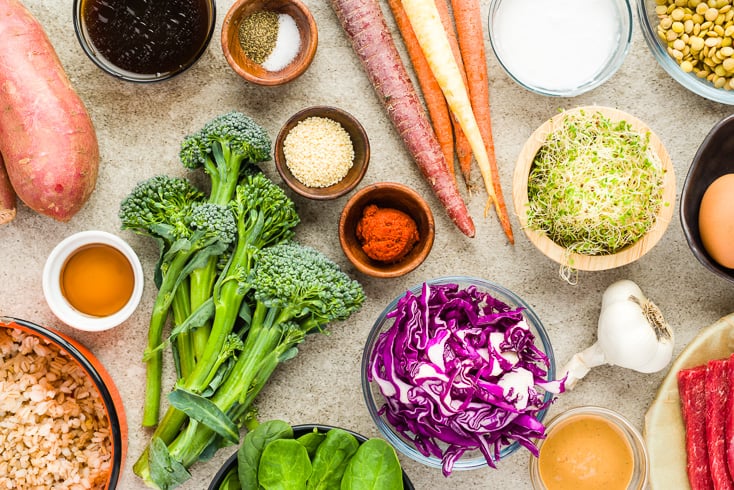
How to Make A Buddha Bowl
Enough talking about Buddha bowls — it’s time to make ours! Start by preheating the oven to 400 degrees Fahrenheit.
First, prep the veggies by peeling the sweet potatoes and carrots. Cut the broccoli into long stalks.
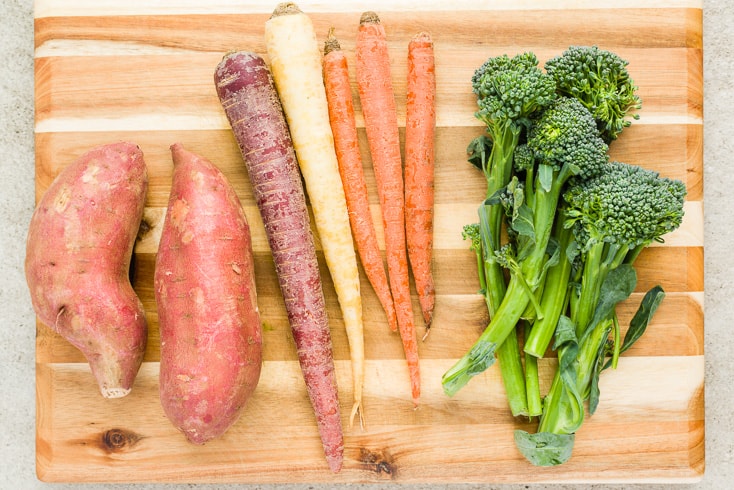
Spread the sweet potatoes, carrots and broccolini on a baking sheet and coat with the avocado oil, salt and pepper. Stick the baking sheet in the oven for 20 minutes.
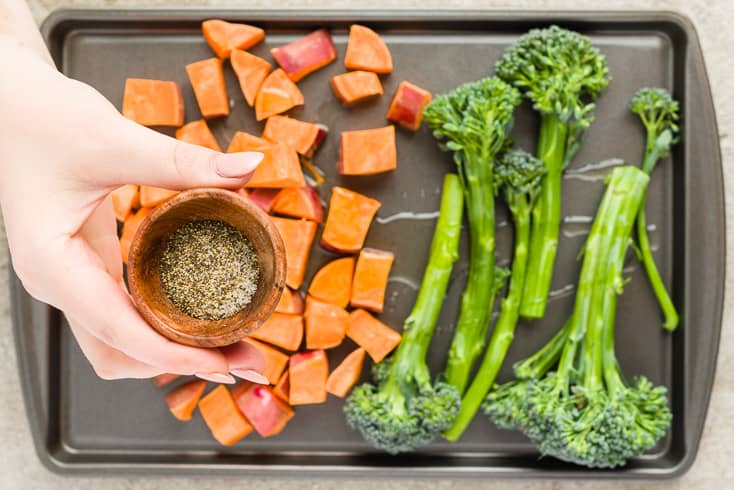
Next, make up your chosen grains, such as quinoa. For example, for quinoa, add one cup to just under two cups of water. Bring to a boil, cover and reduce the heat. Simmer for 15 minutes.
While the veggies roast, if you’re using meat, combine the sesame oil, garlic, beef and sesame seeds in a pan over medium heat. Cook until the steak reaches your desired color of doneness, or 8–10 minutes.
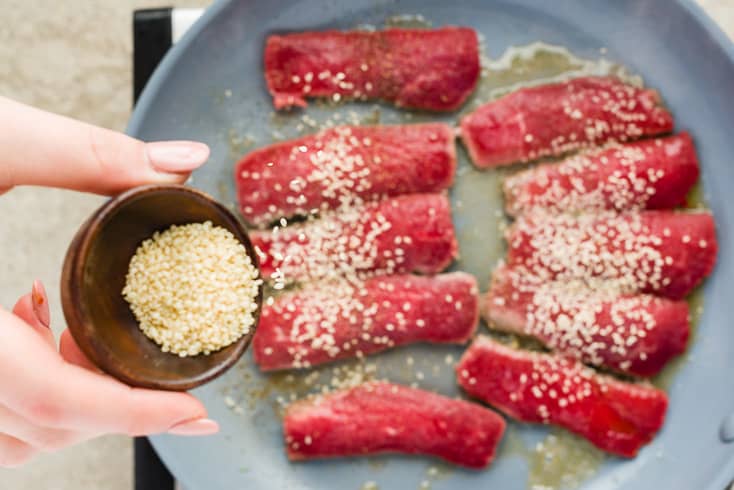
It’s time to make the dressing next. Add all of the cashew sauce ingredients into a small bowl, stirring until they’re well-combined.
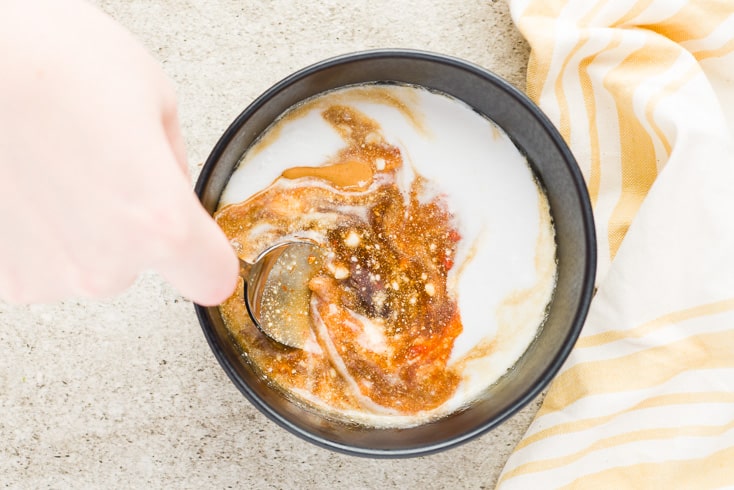
Lastly, if you’re using eggs, poach four eggs. To poach the eggs, bring four cups of water to a boil in a small pot. When the water is boiling, gently lower the eggs into the water and allow them to boil for 3 minutes. Then remove the eggs and set them aside carefully.
When the veggies are roasted, the steak is cooked and the dressing is complete, it’s time to start building your bowl! Divide all of the ingredients evenly among the bowls. I like putting the grains on the bottom and building up from there …
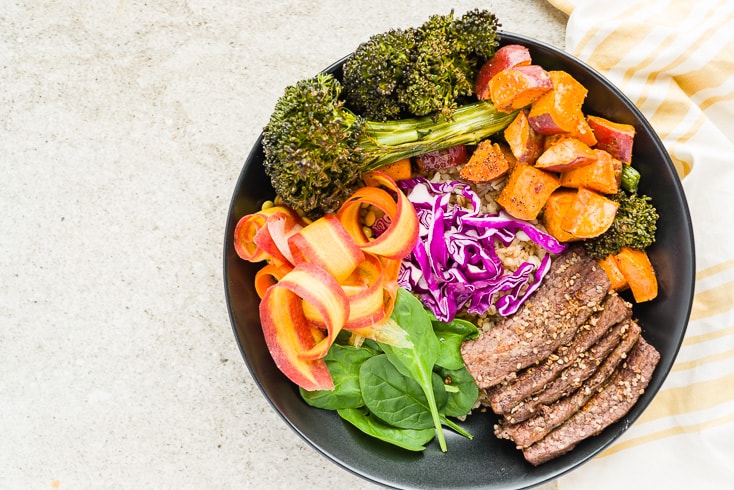
Place the egg on top so you get that beautiful yolk running over the bowl when you cut into it!
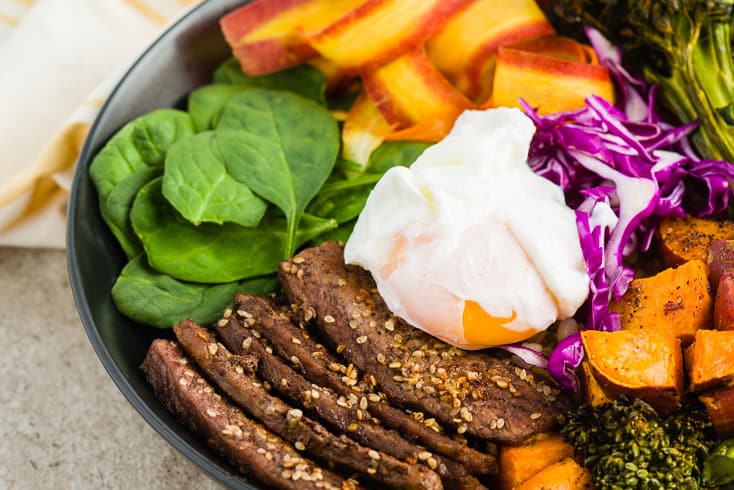
When you’ve assembled your Buddha bowl to your liking, finish it off with the cashew dressing.
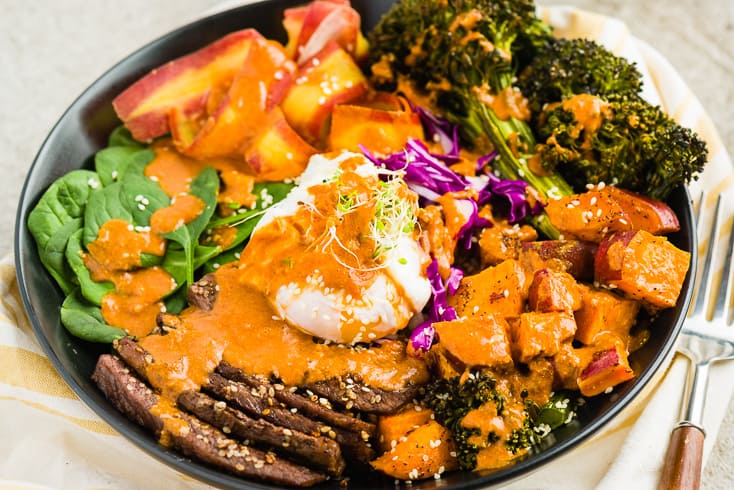
Other One-Bowl Meals
- Cobb salad
- Tuna pasta salad
- Kale Caesar salad
- Chicken paillard salad
- Harvest Mason jar salad
- Salmon kale salad
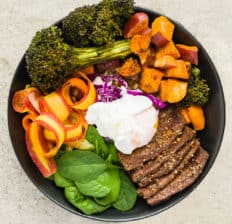
Buddha Bowl with Cashew Sauce
- Total Time: 45 min
- Yield: 4 1x
- Diet: Gluten Free
Description
Have you tried the trendy Buddha bowl? This easily customizable salad usually features grains and vegetables, is often vegan but can also include meat if you choose. This version is full of beautifully balanced ingredients, with a divine cashew dressing.
Ingredients
Salad Base
- 1 tablespoon sesame oil
- 1 teaspoon sesame seeds
- 1 teaspoon garlic, minced
- 1 cup quinoa, uncooked
- 1 cup carrot shavings
- 5 broccolini stalks
- ½ cup lentils, cooked
- 1 cup sweet potatoes, chopped
- 1 cup spinach
- ½ pound flank steak, thinly sliced
- 4 eggs, poached
- 2 tablespoons sprouts
- ¼ cup red cabbage
- ½ teaspoon sea salt
- 1 teaspoon pepper
Cashew Sauce
- ¼ cup cashew butter, unsalted
- 1 tablespoon curry paste
- ¼ cup full-fat canned coconut milk
- 4 tablespoons coconut aminos
Instructions
- Preheat oven to 400 degrees F.
- Prep the veggies, including peeling the sweet potatoes and carrots.
- Place sweet potatoes, carrots and broccolini on a baking sheet.
- Coat evenly with avocado oil, salt and pepper. Bake for 20 minutes.
- Cook the quinoa by putting in a small pan with just under 2 cups of water. Bring to a boil, reduce to simmer, cover and cook for 15 minutes.
- In a pan over medium heat, combine sesame oil, garlic, beef and sesame seeds.
- Cook until desired color is achieved, about 8–10 minutes.
- In a small bowl, combine all cashew sauce ingredients and stir until well-combined.
- Layer all ingredients divided evenly between 4 bowls for serving.
- Top with cashew sauce.
- Prep Time: 20 min
- Cook Time: 25 min
- Category: Salads, Main Dishes
- Method: Oven, Stovetop
- Cuisine: American
Nutrition
- Serving Size: 1 (343g)
- Calories: 548
- Sugar: 7g
- Sodium: 451 (33% DV)
- Fat: 23g
- Saturated Fat: 7.1g
- Unsaturated Fat: 14.3g
- Trans Fat: 0g
- Carbohydrates: 58g
- Fiber: 10.1g
- Protein: 30.4g
- Cholesterol: 116mg
Keywords: buddha bowl recipe

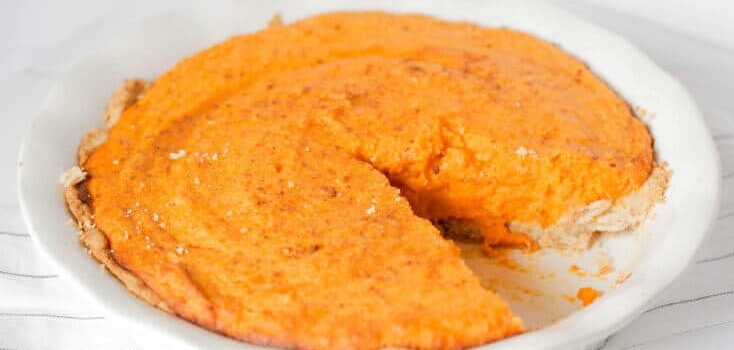
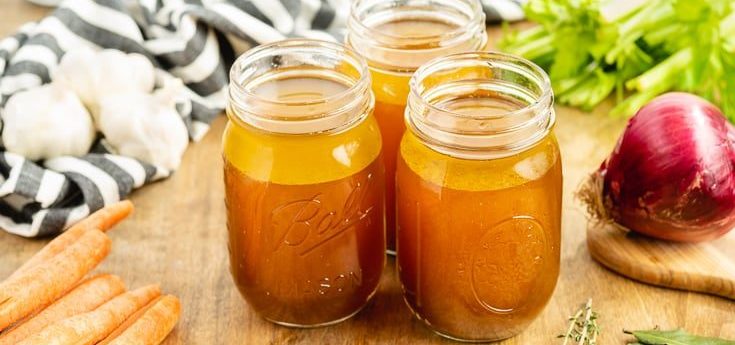
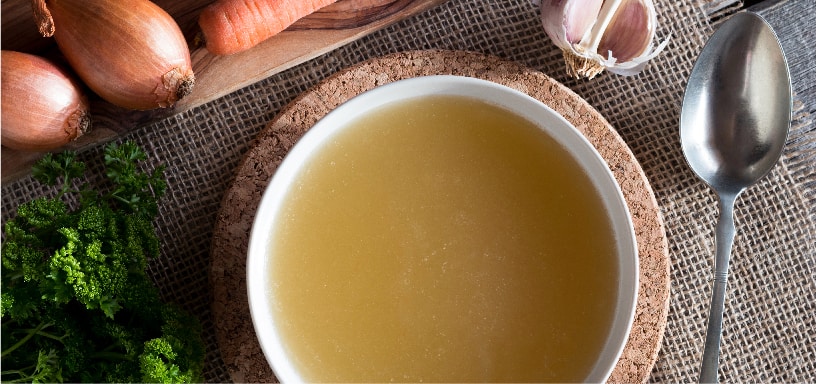
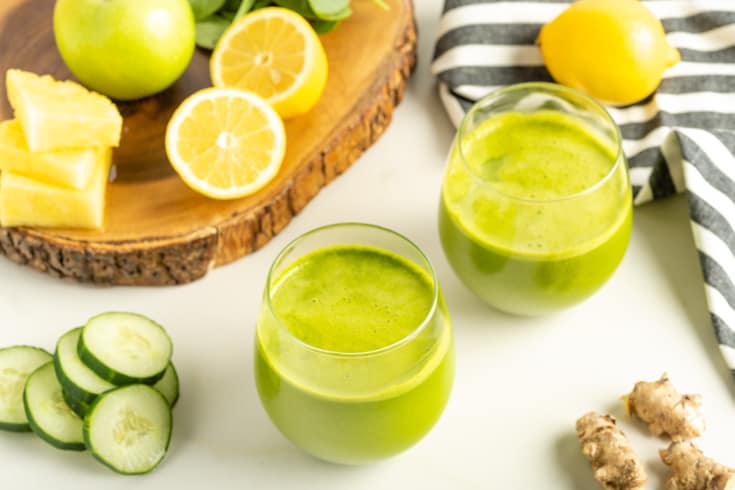

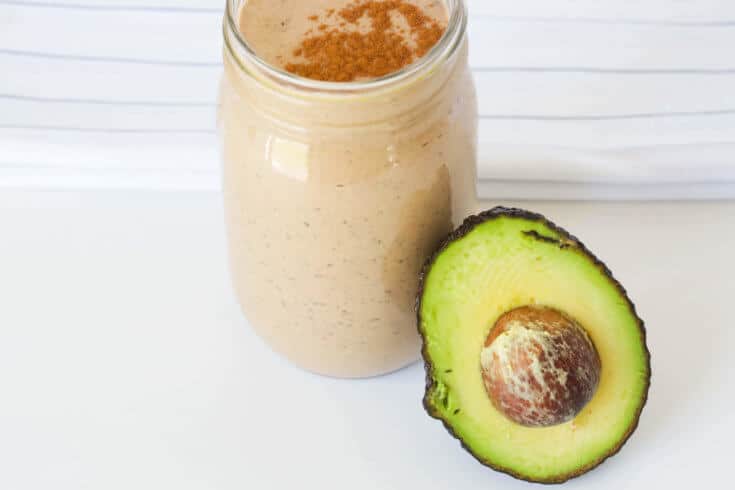

How about a vegetarian version of this? Thanks
Hi Vidya, you can omit the flank steak to make this recipe vegetarian if you’d like. Enjoy!
Looks very good and I can adapt it to my Whole30 plan.
Thank you for the receipe
You’re welcome, Jill! I hope you enjoy. Best of luck on your Whole30 journey.